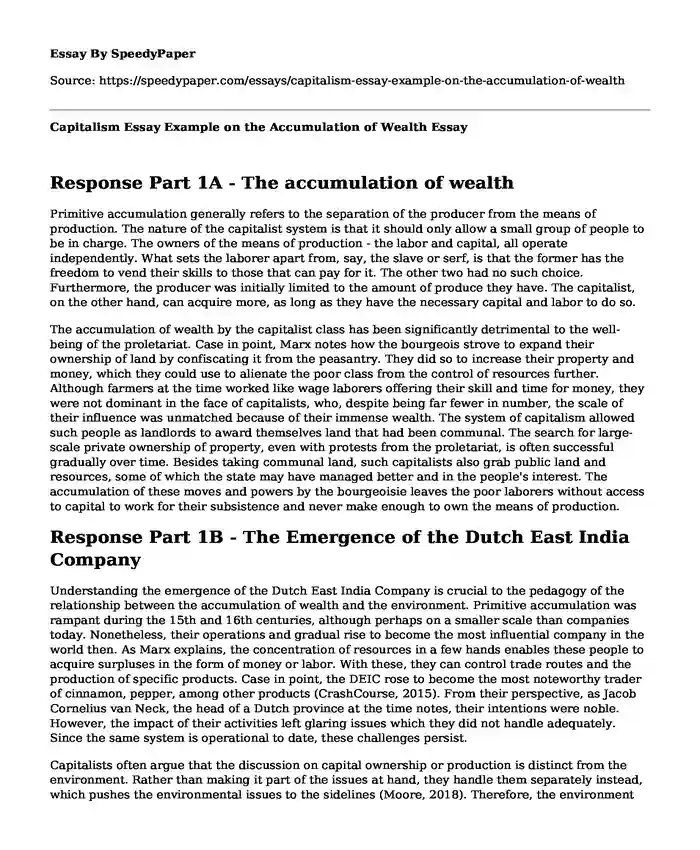
| Type of paper: | Essay |
| Categories: | Capitalism Karl Marx |
| Pages: | 3 |
| Wordcount: | 723 words |
Response Part 1A - The accumulation of wealth
Primitive accumulation generally refers to the separation of the producer from the means of production. The nature of the capitalist system is that it should only allow a small group of people to be in charge. The owners of the means of production - the labor and capital, all operate independently. What sets the laborer apart from, say, the slave or serf, is that the former has the freedom to vend their skills to those that can pay for it. The other two had no such choice. Furthermore, the producer was initially limited to the amount of produce they have. The capitalist, on the other hand, can acquire more, as long as they have the necessary capital and labor to do so.
The accumulation of wealth by the capitalist class has been significantly detrimental to the well-being of the proletariat. Case in point, Marx notes how the bourgeois strove to expand their ownership of land by confiscating it from the peasantry. They did so to increase their property and money, which they could use to alienate the poor class from the control of resources further. Although farmers at the time worked like wage laborers offering their skill and time for money, they were not dominant in the face of capitalists, who, despite being far fewer in number, the scale of their influence was unmatched because of their immense wealth. The system of capitalism allowed such people as landlords to award themselves land that had been communal. The search for large-scale private ownership of property, even with protests from the proletariat, is often successful gradually over time. Besides taking communal land, such capitalists also grab public land and resources, some of which the state may have managed better and in the people's interest. The accumulation of these moves and powers by the bourgeoisie leaves the poor laborers without access to capital to work for their subsistence and never make enough to own the means of production.
Response Part 1B - The Emergence of the Dutch East India Company
Understanding the emergence of the Dutch East India Company is crucial to the pedagogy of the relationship between the accumulation of wealth and the environment. Primitive accumulation was rampant during the 15th and 16th centuries, although perhaps on a smaller scale than companies today. Nonetheless, their operations and gradual rise to become the most influential company in the world then. As Marx explains, the concentration of resources in a few hands enables these people to acquire surpluses in the form of money or labor. With these, they can control trade routes and the production of specific products. Case in point, the DEIC rose to become the most noteworthy trader of cinnamon, pepper, among other products (CrashCourse, 2015). From their perspective, as Jacob Cornelius van Neck, the head of a Dutch province at the time notes, their intentions were noble. However, the impact of their activities left glaring issues which they did not handle adequately. Since the same system is operational to date, these challenges persist.
Capitalists often argue that the discussion on capital ownership or production is distinct from the environment. Rather than making it part of the issues at hand, they handle them separately instead, which pushes the environmental issues to the sidelines (Moore, 2018). Therefore, the environment comes across as the entity that provides the raw materials for production, then takes in the waste from there. What is more astonishing from the Dutch colonization of Southeast Asia is that they sought to create a monopoly to take charge of the entire trade system in the region. It took the form of VOC, which would go on to dominate the market there (CrashCourse, 2015). With the power to create their army, the VOC accumulated power, which they used to plunder the environment. Environment, in this sense, refers to both nature and the people, which the VOC influenced. Therefore, a discussion on the environment, part of which human beings should be is critical in speaking about primitive accumulation.
References
CrashCourse. (2015, March 18). Capitalism and the Dutch East India Company: Crash Course World History 229[Video file]. Retrieved from https://www.youtube.com/watch?v=zPIhMJGWiM8
Moore, J. W. (2018, May 11). How the chicken nugget became the true symbol of our era. Retrieved July 25, 2018, from https://www.theguardian.com/news/2018/may/08/how-the-chicken-nugget-became-the-true-symbol-of-our-era
Cite this page
Capitalism Essay Example on the Accumulation of Wealth. (2022, Jul 07). Retrieved from https://speedypaper.net/essays/capitalism-essay-example-on-the-accumulation-of-wealth
Request Removal
If you are the original author of this essay and no longer wish to have it published on the SpeedyPaper website, please click below to request its removal:
- Free Essay on Sex Biases in Media
- Free Essay on Youth and Politics
- Forensic Accountant Essay Example
- Free Essay on the Book by Brian Greene: The Elegant Universe
- Movie Review Essay Sample: Cultural Interpretation of the Thai Culture in The Hangover Part 2
- Free Essay Answering How Does Greek Financial Crisis Influence EU Economy Over Time
- Witness Tampering in the Criminal Justice System - Free Essay Example
Popular categories




